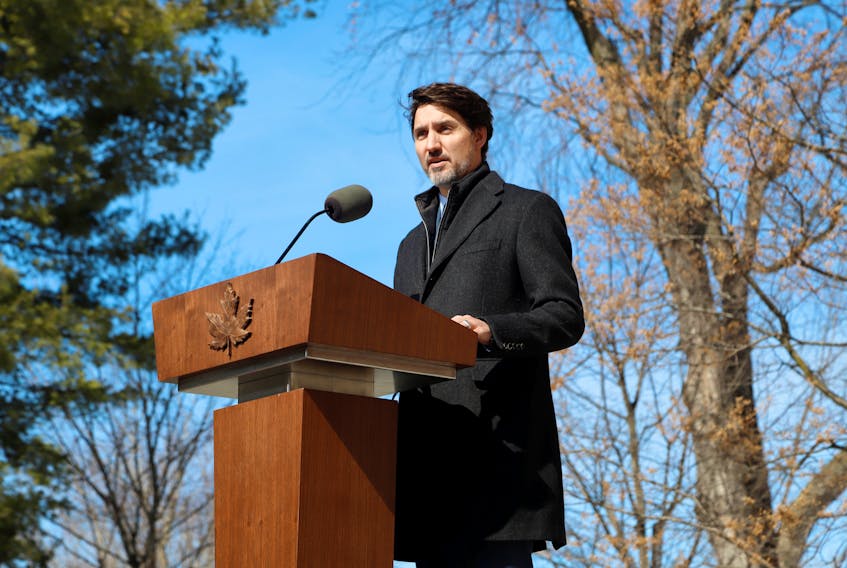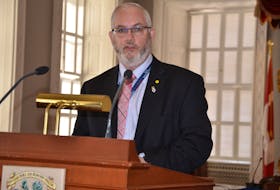OTTAWA — Ottawa is providing $27 billion in aid for Canadians and businesses affected by the COVID-19 crisis.
The sweeping suite of measures was announced by Prime Minister Justin Trudeau as he addressed the media from self-quarantine for the third time in as many days.
In addition, the government has also announced $55 billion to meet liquidity needs of Canadian businesses and households through tax deferral.
Combined, these measures amount to $82 billion and represent more than three per cent of Canada’s GDP.
The major aid measures are meant to target low-income Canadians and those who are not covered by EI.
An Emergency Care Benefit of up to $900 bi-weekly for up to 15 weeks, comparable to EI, will provide income support to workers who must stay home and do not have access to paid sick leave.
Trudeau said this will be available to workers, including the self-employed, who are sick, quarantined, or who have been directed to self-isolate but do not qualify for EI sickness benefits; workers who are taking care of a family member who is sick with COVID-19, such as an elderly parent or other dependents who are sick, but do not qualify for EI sickness benefits; as well as EI-eligible and non-EI-eligible working parents who must stay home without pay with children because of school closures or because their children or ill.
An emergency support benefit, delivered through the Canada Revenue Agency, will also provide up to $5 billion in support to workers who are not eligible for EI and who are facing unemployment.
Expanding on this, Finance Minister Bill Morneau said these benefits will start rolling in for families by early April, and qualification will require a simple online attestation that does not need to be backed up by medical documentation.
Ottawa will extend the tax-filing deadline for individuals to June 1, and allow all taxpayers, including businesses, to defer until after August 31 the payment of any income tax amounts that become owing on or after March 18 and before September 2020 — no interest or penalties will accumulate on these amounts during this period.
The government also committed to temporarily boosting the Canada Child Benefit payment in the coming months and to top-up payments under the Goods and Services Tax (GST) credit — eligible adults could receive up to $300 and up to $150 for each child in May.
There will also be a six-month, interest-free, moratorium on Canada Student Loan payments and a reduction in minimum withdrawals from Registered Retirement Income Funds (RRIFs) by 25 per cent for 2020.
As for measures for businesses, not-for-profit organizations and charities, the government will provide eligible small businesses with a 10-per-cent wage subsidy for the next 90 days, up to a maximum of $1,375 per employee and $25,000 per employer to help Canadians keep their jobs.
There will be increased flexibility to lenders to defer mortgage payments on homeowner government-insured mortgage loans to borrowers who may be experiencing financial difficulties related to the outbreak, beginning immediately.
Finally, Trudeau also announced increased funding for community organizations targeting homelessness and domestic violence as well as Indigenous communities.
These measures come in addition to a number announced last week to help EI eligible Canadians: waiving of the mandatory one-week Employment Insurance waiting period for workers and enhancements to the existing work-sharing program to help support employers and their workers who are experiencing a downturn in business due to COVID-19.
The government has already announced a $1 billion COVID-19 response package to assist provinces, communities and the medical community in their fight against the virus as well as a $10-billion in available credit through the Business Development Bank and Export Development Canada to businesses impacted by COVID-19.
Also On Wednesday, Trudeau announced that the U.S. and Canada had mutually agreed to restrict non-essential travel over the U.S./Canada land border. This means travellers will not be able to cross the border for recreational or tourism reasons.
Trudeau assured that supply chains for fuel, food, and other essential goods would not be affected, nor would other essential travel.
U.S. President Donald Trump announced the agreement just ahead of Trudeau’s press conference.
This comes following Ottawa announced that, as of Wednesday, Canada's air borders would be closed to everyone except Canadian citizens and permanent residents and their immediate families, but that the U.S. land border would not be affected. The government was heavily criticised for exempting U.S. citizens for the closure, especially as cases of COVID-19 rise quickly south of the border, and in light of widespread concern with how the U.S. is handling the outbreak.
More to come









